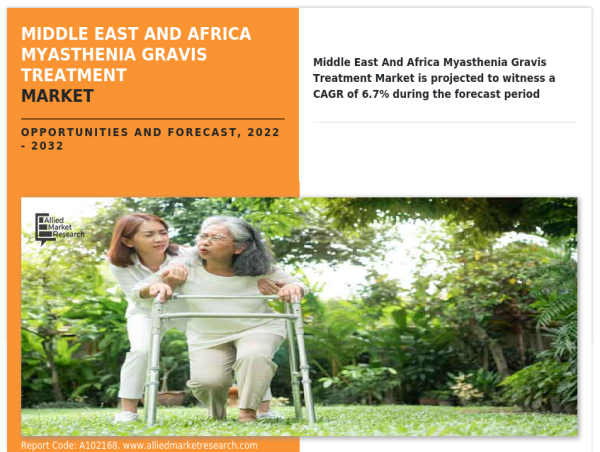The Middle East and Africa myasthenia gravis treatment market is anticipated to witness notable traction owing to rise in prevalence of neurological disorders.
PORTLAND, OREGON, UNITED STATES, December 7, 2023 /EINPresswire.com/ -- 𝑰𝒏𝒕𝒓𝒐𝒅𝒖𝒄𝒕𝒊𝒐𝒏:
Myasthenia Gravis (MG) is a rare neuromuscular disorder characterized by muscle weakness and fatigue. While it can affect individuals worldwide, there has been a growing focus on improving the diagnosis and treatment of MG in the Middle East and Africa. In recent years, advancements in medical research and healthcare infrastructure in these regions have contributed to more effective management of this chronic autoimmune disease.
The Middle East and Africa myasthenia gravis treatment market is driven by factors such as rise in clinical trials by biopharmaceutical companies, availability of patent grants to the companies, and boost in efforts by healthcare institutions & government bodies. The Governments of the Middle East and Africa are investing considerably in R&D of healthcare and promoting adoption of advanced healthcare facilities. This is projected to boost the development of the myasthenia gravis treatment market. Despite, poor healthcare infrastructure and scarce detection frequency of the disease, the discovery of novel medications is anticipated to drive the growth of the market.
𝑹𝒆𝒒𝒖𝒆𝒔𝒕 𝑺𝒂𝒎𝒑𝒍𝒆 𝑪𝒐𝒑𝒚 𝒐𝒇 𝑹𝒆𝒑𝒐𝒓𝒕- https://www.alliedmarketresearch.com/request-sample/102652
𝑫𝒊𝒂𝒈𝒏𝒐𝒔𝒊𝒔 𝒂𝒏𝒅 𝑨𝒘𝒂𝒓𝒆𝒏𝒆𝒔𝒔:
One of the key challenges in treating Myasthenia Gravis is its often-delayed diagnosis due to its complex and varied symptoms. In the Middle East and Africa, efforts have been made to raise awareness among healthcare professionals and the general public about the signs of MG, leading to earlier detection and intervention.
Improvements in Diagnostic Tools:
Advanced diagnostic tools, including electromyography (EMG) and blood tests to detect specific antibodies, have become more accessible in the Middle East and Africa. These tools aid in confirming MG diagnoses, allowing for more targeted and timely treatment.
Treatment Options:
Traditionally, MG has been managed through acetylcholinesterase inhibitors, immunosuppressants, and, in severe cases, thymectomy. However, recent developments in the Middle East and Africa have seen the introduction of novel therapeutic options.
Biological Therapies:
Biologic agents targeting specific immune pathways have shown promise in MG treatment. Rituximab, an anti-CD20 monoclonal antibody, has demonstrated efficacy in controlling symptoms by modulating the immune response. This treatment option has become increasingly available in the Middle East and Africa, offering new hope for patients.
Immunomodulatory Therapies:
Immunomodulatory therapies, such as intravenous immunoglobulin (IVIG), have gained popularity for their ability to provide rapid relief of symptoms. The accessibility of these therapies has improved, ensuring a more widespread and timely application in the region.
Telemedicine and Remote Monitoring:
The use of telemedicine has facilitated access to specialist care, particularly in remote areas. Patients in the Middle East and Africa can now consult with MG experts and receive ongoing monitoring of their condition through virtual platforms, ensuring consistent care and timely adjustments to treatment plans.
𝐈𝐧𝐪𝐮𝐢𝐫𝐞 𝐘𝐨𝐮𝐫 𝐄𝐯𝐞𝐫𝐲 𝐃𝐨𝐮𝐛𝐭 𝐇𝐞𝐫𝐞: https://www.alliedmarketresearch.com/purchase-enquiry/102652
𝑪𝒉𝒂𝒍𝒍𝒆𝒏𝒈𝒆𝒔 𝒂𝒏𝒅 𝑭𝒖𝒕𝒖𝒓𝒆 𝑷𝒓𝒐𝒔𝒑𝒆𝒄𝒕𝒔:
While progress has been made in MG treatment in the Middle East and Africa, challenges persist. Limited awareness, financial constraints, and uneven distribution of healthcare resources remain obstacles to optimal MG care. Collaborative efforts between healthcare providers, patient advocacy groups, and policymakers are essential to address these challenges.
The future holds promise for further advancements in MG treatment, with ongoing research into innovative therapies and a growing emphasis on personalized medicine. As awareness continues to increase and healthcare infrastructure develops, the Middle East and Africa are poised to offer improved quality of life for individuals living with Myasthenia Gravis.
𝑪𝒐𝒏𝒄𝒍𝒖𝒔𝒊𝒐𝒏:
The landscape of Myasthenia Gravis treatment in the Middle East and Africa is evolving, with a focus on early diagnosis, advanced therapeutic options, and enhanced patient care through telemedicine. As the medical community in these regions continues to collaborate and innovate, there is hope for a brighter future for those affected by MG, reflecting a broader trend of progress in healthcare across the globe.
Our Market Research Solution Provides You Answer to Below Mentioned Question:
Which are the driving factors responsible for the growth of market?
Which are the roadblock factors of this market?
What are the new opportunities, by which market will grow in coming years?
What are the trends of this market?
Which are main factors responsible for new product launch?
How far will the market grow in forecast period in terms of revenue, sales and production?
How will each segment grow over the forecast period and how much revenue will these segments account for in 2032?
David Correa
Allied Analytics LLP
+ +1 800-792-5285
email us here
Visit us on social media:
Facebook
Twitter
LinkedIn



